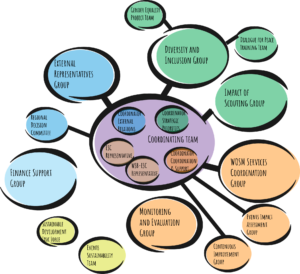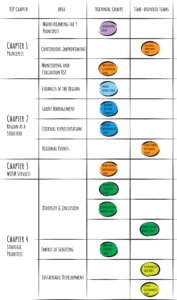The European Scout Region of the World Organization of the Scout Movement (WOSM) is pleased to present you the adopted Operational Framework under which the new volunteer structure will operate to support the delivery of the Regional Scout Plan 2019-2022 “Growing Together in Europe”.
The Journey of an Improved Selection Process
True to the requests of the Member Organisations and following the guidelines and recommendations of the Continuous Improvement Team for the Triennium 2016-2019, we focused efforts to achieve:
- more transparency in the recruitment and selection phase: by assigning specialised Consultants to pMocess the application and clarifying the roles and responsibilities of the appointed Coordinators and Team Leads along the selection process.
- More agility and flexibility of the framework: by creating time bounded and project-related teams with clear deliverables and expectations.
- Better balance on all criteria: by bringing further attention to the diversity of the team, in addition to the expected skills and competencies.
To this effect and as per the process described in the Volunteering at European Level – Open Call 2019-2022 (Regional Cirular 23 2019) a series of steps were followed:
- August 2019: A generic Open Call for volunteers willing to become part of the Operational Framework was launched
- September-October 2019: A team of WOSM Consultants on Adults In Scouting worked through the applications and created short lists based on the content of the Regional Scout Plan 2019-2022 adopted in Split and the set of competencies required to best achieve its goals.
- October 2019: The European Scout Committee defined the Operational Framework and selected the Coordinators for each of the Areas of Operation identified, on the occasion of its Induction.
- October-November 2019: The Coordinators’ Team, defined the set-up of their Areas of Operation and, based on the shortlists provided by the selection team, selected Team Leads and identified potential team members which were, subsequently, approved by the Committee over its first Business meeting.
- November-December 2019: Coordinators and Team Leads worked together to finalise the composition of their teams (in this first phase), reached out to all the people and arranged the details of their engagement.
The Achievements of the Selection Process
A long process, indeed, which possibly tested the patience of all volunteers involved but which, we think, was a useful exercise because for the first time:
- The initial selection was delegated to an external group of experts, with no vested interest in the results but who know and understand all the intricacies of the Region
- By strengthening the role of the Coordinators’ team, we clarified the strategic role of the Committee and the operational role of the Coordinators, while giving a strong monitoring responsibility to the team itself
- By opting for an agile system, which keeps to a minimum the teams’ set-up for the Triennium and focuses more in task-oriented, time-bounded groups of volunteers, we hope to streamline and make the work more efficient, while giving all volunteers the proper sense of accomplishment, all while using wisely the resources of the Region.
- Due diligence was given to properly follow the Adults in Scouting model for the life of the volunteer. Terms of Reference and Role Descriptions were laid out and Mutual Agreements are now consistently introduced. This is a time-consuming streamlining exercise which we are convinced will pay off later in the process when clear written roles and responsibilities will help progress the work.
- Ensuring the balance in terms of gender, age, geographical representation, previous experience in the regional structures, etc. was at the core of all discussions and meant that a lot of coordination had to happen among all Areas of Operation.
- Last but not least, the European Scout Committee decided to opt for a Triennium-long open call which allows the Region for far better flexibility for its teams, with current structures much better defined in time and with new ones potentially being set-up as project groups or planning teams all along the triennium.
We look forward demonstrating the clear impact of these achievements along the Triennium and can already report some lessons learned for the next process, after all, Continuous Improvement is one of the guiding principles of the Regional Scout Plan and through testing new ways to support the volunteers delivering the Plan we’ll achieve exactly that!
The Operational Framework of the Selection Process
The Operational Framework follows, in broad terms, the structure of the European Regional Scout Plan while reflecting the specificities of each focus area through a different team set-up where needed. In summary it is composed as follows.


Three Areas of Operation
- Strategic Priorities bringing together all actions and structures in relation to the three strategic priorities identified in the Plan (noting that Sustainable Development will be treated separately at first – roughly covering Chapter 4 of the Plan.
- External Relations covering all actions and structures in relation to the Region’s position in the political and NGO-based structures at European level, its partnerships and attracting and managing funds – covering standing aspects from Chapter 2 of the Plan.
- Coordination and Support covering all actions and structures in relation to the overall coordination, monitoring and evaluation of the process of delivering the Plan process, including all working methods and WOSM Services – covering some newer aspects from Chapter 2 and all of Chapter 3 of the Plan.
One Think Tank
- For the benefit of definition and focus, the content of the Sustainable Development Strategic Priority is to be discussed first within a time-bound Think Tank, to deliver a proposal for a specific Action Plan (and the related working methods and resources needed) within the next 6 months. Once these agreed upon, the actions and structures would become an integral part of the Strategic Priorities Area of Operation.
One Coordinating Team
- The work within the three Areas of Operation is not isolated. The complex relationship and interdependence of all actions are overseen by a team comprising the three Coordinators, a representative of the European Scout Committee and one of the World Scout Bureau-European Support Centres. Besides harmonising and creating synergies between various actions, the Coordinating Team is responsible for mainstreaming the principles defined in the Plan, monitoring the delivery process of the Plan, and acting as an interface between the strategic oversight of the Committee and the actions of the volunteers within the Operational Framework.
Other Working Groups
- The Financial Support Group (FSG) is a team of volunteers supporting the work of the Regional Treasurer. Their specific Action Plan is currently mainly focused on the implementation of Financial Management Best Practices and will, in due time, be informed and influenced by the other working structures.
- The Regional Decision Committee (RDC) for the Messengers of Peace Support Fund is a group of volunteers overseeing the implementation of the Messengers of Peace projects in the European Region.
Appointment of Coordinators and Regional Volunteers
A long process started at the beginning of the summer, is now finalised and we are grateful for all those involved, from all enthusiastic volunteers who selflessly offered their time and expertise to the Region to the selected Coordinators and Team Leads for the countless conversations and analysis to ensure the best and most balancedoutcome.
We would like to offer a special thank you to the WOSM Consultants who supported the evaluation process of the applications
- Amir Cheema – The Scout Association, United Kingdom
- Johanna Rossell – scouterna, Sweden
- Saâd Zian – Eclaireurs et Eclaireuses de France, France
and to the appointed Coordinators
- Lana Husagić – Savez izviđača Bosne i Hercegovine, Bosnia and Herzegovina
- Beatričė Leiputė – Lietuvos skautija, Lithuania
- Laura Neijenhuis – Scouting Nederland, the Netherlands
Check the complete List of appointed Regional Volunteers to see you will support the European Scout Committee to achieve objectives set in the European Regional Scout Plan 2019-2022.